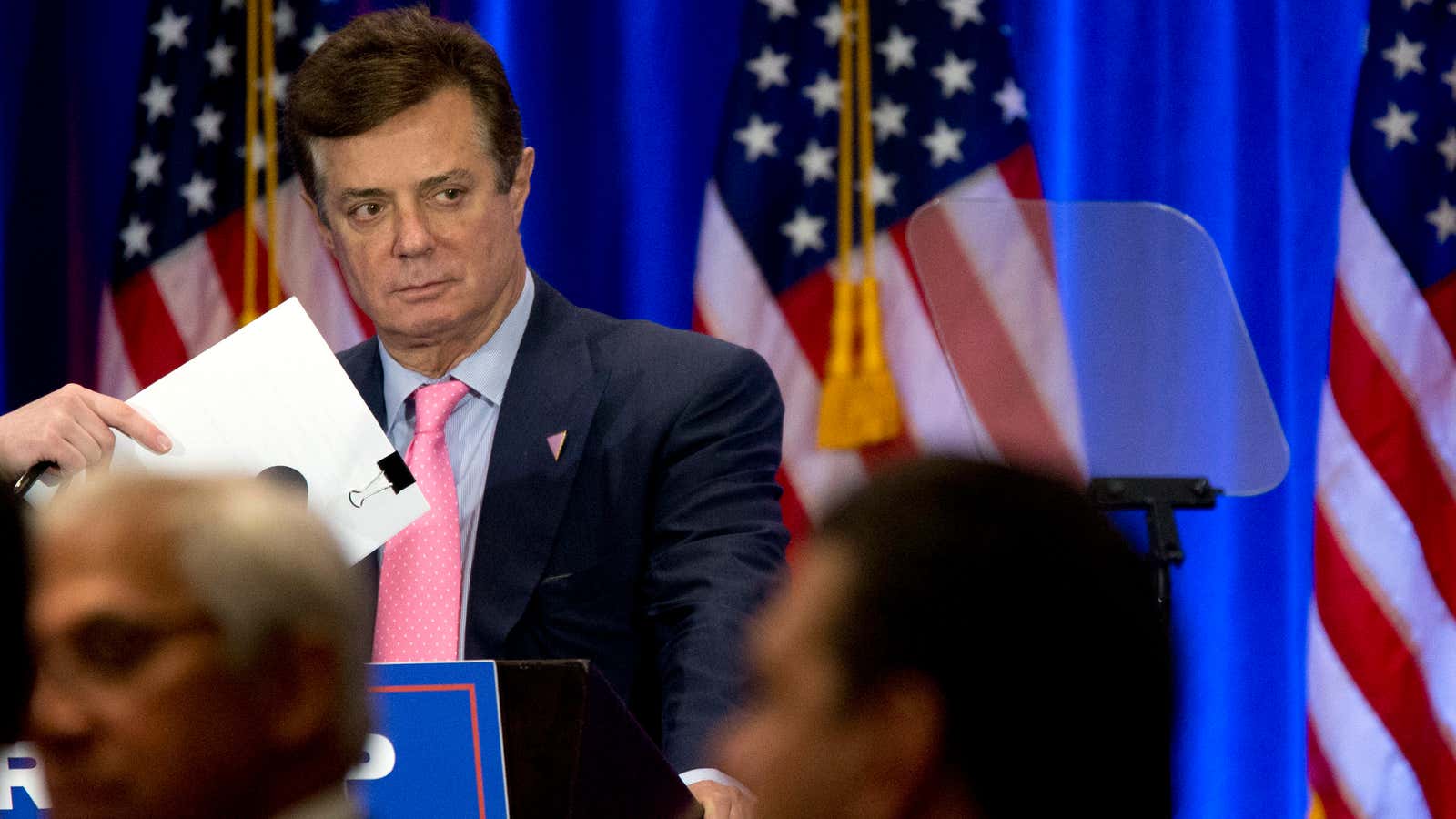Paul Manafort, whose stint as Donald Trump’s presidential campaign manager has become a focus of federal investigators because of his ties with Russia, is now also facing scrutiny for three real-estate purchases he made in New York City. Why would this be a signal of possible corruption?
Location, location, location
Real estate in big cities like New York or London has become a favored method for criminals to launder money. It’s a safer and more lucrative place to park ill-gotten gains than a bank: Prices are steadily rising, it can generate rental income, and the regulatory obligations for real-estate sellers and brokers to “know their customer” are much looser than for banks. And if they need cash, buyers can take loans out against the asset, creating a source of “clean” funds.
“It is apparent in our data that essentially criminals are parking dirty money, criminal proceeds, in luxury real estate, as a place to hide it, as well as place to invest it, as well as a place to enjoy it,” Jennifer Shasky Calvery, then the director of the US Financial Crimes Enforcement Network (Fincen), told Quartz last year.
At the time, Fincen was setting up a kind of sting operation. In major real-estate markets, it instituted rules requiring shell companies that make all-cash purchases of real estate to disclose their true owners. In the first year of the operation, about 30% of these transactions were linked to people whom banks had previously identified to Fincen as suspected money launderers.
Manafort about town
Why is Manafort under scrutiny? Well, he made all-cash purchases of real estate through shell companies and then took out loans against them. None of this is illegal in itself, but it was exactly the pattern that Fincen identified as a signal of possible money laundering. WNYC investigated these transactions in detail:
Between 2006 and 2013, Manafort bought three homes in New York City, paying the full amount each time, so there was no mortgage. Then, between April 2015 and January 2017 – a time span that included his service with the Trump campaign – Manafort borrowed about $12 million against those three New York City homes: one in Trump Tower, one in Soho, and one in Carroll Gardens, Brooklyn.
The purchases were initially made by shell companies before they were transferred into Manafort’s name without payment.
In a statement after the WNYC story, Manafort said the purchases were above-board: ”There is nothing out of the ordinary about them and I am confident anyone who isn’t afflicted with scandal-fever will come to the same conclusion.”
Timing is everything
The questions about these purchases are linked to Manafort’s other activities at the time. During the period when he bought those homes, it has been alleged that he was receiving payments from powerful businessmen, some with reputed criminal connections, in Ukraine and Russia.
The New York Times, for example, reported on ledgers (paywall) discovered after Ukraine’s former president, Viktor Yanukovych, fled the country. The ledgers detail payments of some $12.7 million made to Manafort from 2007 to 2012, approximately the same period he was purchasing the New York City real estate. He has denied receiving those payments.
More recently, the Associated Press has reported that in 2006, Manafort signed a $10 million contract with Russian oligarch Oleg Deripaska, an associate of president Vladimir Putin, to promote Russian interests in the US. While both Manafort and Deripaska acknowledge their relationship, they say it was consulting work, not lobbying. (Manafort did not file the legal disclosures required in the US to lobby for foreign interests during that period.)
And today, NBC reports that Manafort’s accounts at a bank in Cyprus between 2007 and 2012 raised questions of potential money laundering. When the bank asked him to provide more information about the accounts, Manafort instead closed them. A Manafort spokesperson told NBC that “all were legitimate entities and established for lawful ends.”
Red flag or coincidence?
Manafort has consistently said his political consulting work is no different from what lobbyists do for any other interests in a democracy, however unsavory the clients. Perhaps it was simply his misfortune to be tied to the Trump campaign at the time it was attacking a rival for foreign connections and benefitting from bold interference by Russian intelligence.
But, if you want to understand why investigators are so interested, it’s because Manafort’s financial transactions fit the pattern commonly used to launder illicit funds into the US.
